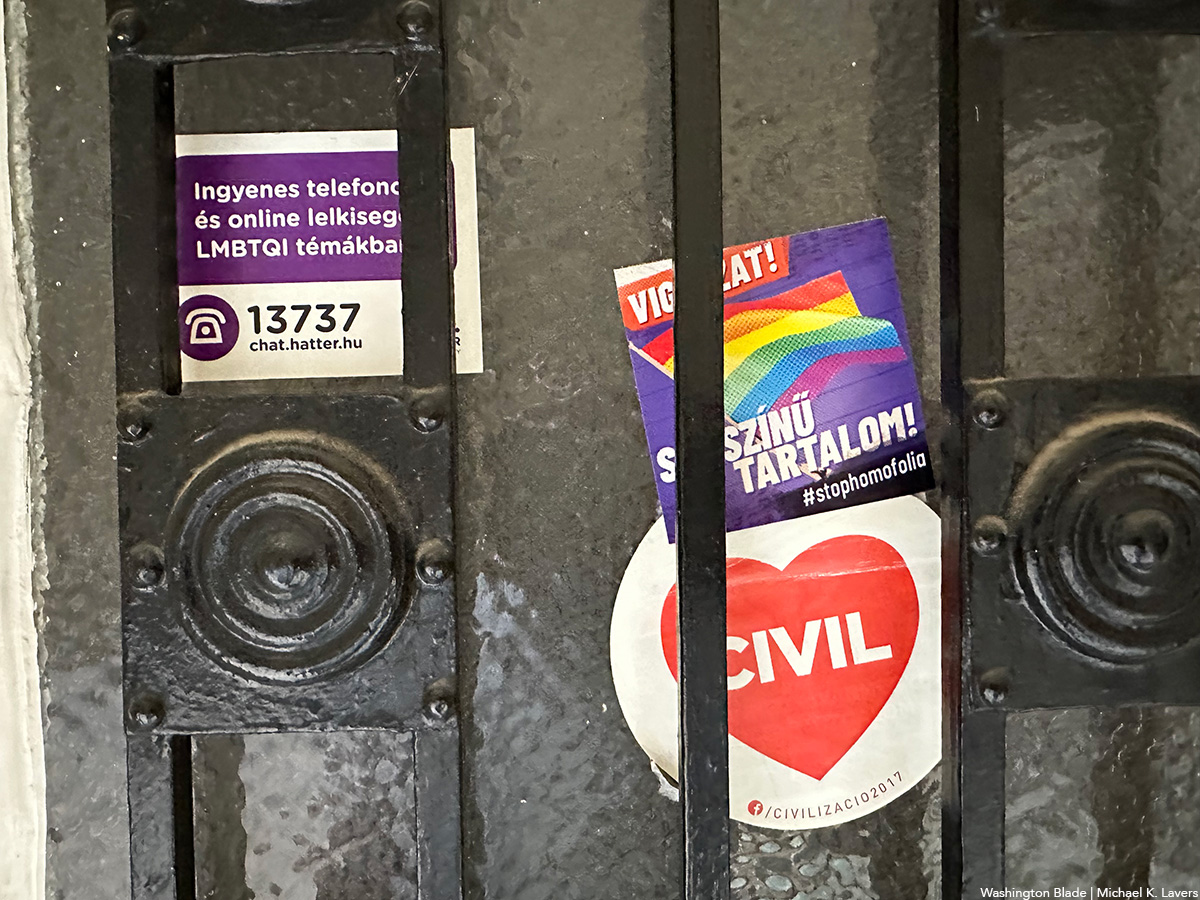Europe
Andorra lawmakers extend civil marriage equality to same-sex couples
Small European country’s family code revised

Lawmakers in Andorra on Thursday voted unanimously to extend civil marriage rights to same-sex couples.
Andorra is a small country known for its ski areas that is nestled between Spain and France in the Pyrenees.
Media reports indicate the new Andorran family code that lawmakers approved eliminates the legal differences between married heterosexual couples and gays and lesbians who have entered into civil partnerships.
“Today we are voting on a law for everyone, which includes all of us,” said Carles Enseñat, president of Andorra’s Democratic Parliamentary Group, before the vote. “[It is] a law of a modern country that ensures the free development of citizenship and bases its success on the most primordial organizational nucleus — the family — with all its diversity.”
Spain and France are among the European jurisdictions in which same-sex couples can legally marry.
The Slovenia Constitutional Court earlier this month ruled a law that limited marriage and adoption rights to heterosexual partners is unconstitutional. Switzerland’s marriage equality law took effect on July 1.
It is not immediately clear when Andorra’s new family code takes effect.
Hungary
Hungarian MPs amend constitution to ban public LGBTQ events
Viktor Orbán’s government spearheaded amendment

Hungarian MPs on Monday voted to amend their country’s constitution to ban public LGBTQ events.
The vote took place less than a month after lawmakers banned Pride events and gave authorities the green light to use facial recognition technology to identify those who participate in them.
The Associated Press notes MPs approved the constitutional amendment — which Prime Minister Viktor Orbán’s Fidesz-KDNP coalition government proposed — by a 140-21 vote margin. Authorities before the vote removed a group of protesters who tried to block the entrance to a parliament parking garage.
Orbán’s government over the last decade has moved to curtail LGBTQ and intersex rights in Hungary.
A law that bans legal recognition of transgender and intersex people took effect in 2020. Hungarian MPs that year also effectively banned same-sex couples from adopting children and defined marriage in the constitution as between a man and a woman.
An anti-LGBTQ propaganda law took effect in 2021. The European Commission sued Hungary, which is a member of the European Union, over it.
MPs in 2023 approved the “snitch on your gay neighbor” bill that would have allowed Hungarians to anonymously report same-sex couples who are raising children. The Budapest Metropolitan Government Office in 2023 fined Lira Konyv, the country’s second-largest bookstore chain, 12 million forints ($33,115.76), for selling copies of British author Alice Oseman’s “Heartstopper.”
Former U.S. Ambassador to Hungary David Pressman, who is gay, participated in the Budapest Pride march in 2024 and 2023. Pressman was also a vocal critic of Hungary’s anti-LGBTQ crackdown.
The Washington Blade has reached out to Budapest Pride for comment on the constitutional amendment.
Denmark
Denmark issues US travel advisory for transgender people
Federal government only recognizes two genders: Male and female

Denmark is the latest country to issue a travel advisory for transgender people who plan to visit the U.S.
“When applying for an ESTA (Electronic System for Travel Authorization) or visa to the United States, there are two gender designations to choose from: Male or female,” reads the travel advisory the Danish Foreign Affairs Ministry issued on Friday, according to the Associated Press. “If you have the gender designation ‘X’ in your passport, or you have changed your gender, it is recommended that you contact the U.S. Embassy prior to travel for guidance on how to proceed.”
President Donald Trump shortly after he took office on Jan. 20 issued an executive order that bans the State Department from issuing passports with “X” gender markers. Secretary of State Marco Rubio in response to directive ordered State Department personnel to “suspend any application requesting an ‘X’ sex marker and do not take any further action pending additional guidance from the department.”
Trump on Feb. 5 issued another executive order that bans trans women and girls from female sports teams. The Guardian reported Rubio later instructed American consular officials to deny visas in “cases where applicants are suspected of misrepresenting their purpose of travel or sex.”
The German government earlier this month issued a travel advisory for trans and nonbinary people who are planning to visit the U.S. The AP notes Finland followed suit.
WorldPride is scheduled to take place in D.C. from May 17-June 8.
InterPride, the organization that coordinates WorldPride events, on March 12 issued its own travel advisory for trans and nonbinary people who want to travel to the U.S.
“Due to an executive order issued by the U.S. president on Jan. 20, all travelers must select either ‘male’ or ‘female’ when applying for entry or visas. The gender listed at birth will be considered valid,” reads the advisory. “If your passport has ‘X’ as a gender marker or differs from your birth-assigned gender, we strongly recommend contacting the U.S. diplomatic mission before traveling to confirm entry requirements.”
The Capital Pride Alliance is the local WorldPride host. Capital Pride said it is working on the guide mentioned in the InterPride advisory.
The guide has yet to be released.
The African Human Rights Coalition, a group that promotes LGBTQ rights in Africa, last week called for a boycott of WorldPride, noting an “antagonistic fascist regime which presents distinct dangers to foreign LGBTQI+ attendees” now governs the U.S. Egale Canada, one of Canada’s largest LGBTQ advocacy organizations, in February announced its members will not attend WorldPride and any other event in the U.S. because of the Trump-Vance administration’s policies.
Hungary
New Hungarian law bans Pride marches
Viktor Orbán’s government has cracked down on LGBTQ rights

Hungarian lawmakers on Tuesday passed a bill that would ban Pride events and allow authorities to use facial recognition technology to identify those who participate in them.
The Associated Press reported thousands of protesters gathered outside the Hungarian parliament in Budapest, the country’s capital, after MPs approved the measure by a 136-27 vote margin. The protesters later blocked traffic on the nearby Margaret Bridge over the Danube River.
“Not only does this law introduce discriminatory and simply evil restrictions on freedom of assembly, but it was also adopted in a highly undemocratic manner, through an extraordinary procedure that did not allow for any real debate,” said Tamás Dombos of the Háttér Society, a Hungarian LGBTQ and intersex rights group, in a statement that Outright International released after the vote. “They proposed it yesterday, and the parliament adopted it today.”
Amnesty International Hungary Director Dávid Vig also criticized the vote.
“This law is a full-frontal attack on the LGBTI community and a blatant violation of Hungary’s obligations to prohibit discrimination and guarantee freedom of expression and peaceful assembly,” said Vig.
Prime Minister Viktor Orbán and members of his government in recent weeks said they would ban public Pride marches in Budapest. The 30th Budapest Pride is scheduled to take place on June 28.
“The Hungarian government is trying to restrict peaceful protests with a critical voice by targeting a minority,” said Budapest Pride on Tuesday in a statement the Washington Blade published. “Therefore, as a movement, we will fight for the freedom of all Hungarians to protest!”
Orbán and members of his ruling Fidesz party over the last decade have moved to curtail LGBTQ and intersex rights in Hungary.
A law that bans legal recognition of transgender and intersex people took effect in 2020. Hungarian MPs that year also effectively banned same-sex couples from adopting children and defined marriage in the constitution as between a man and a woman.
An anti-LGBTQ propaganda law took effect in 2021. The European Commission sued Hungary, which is a member of the European Union, over it.
MPs in 2023 approved the “snitch on your gay neighbor” bill that would have allowed Hungarians to anonymously report same-sex couples who are raising children. The Budapest Metropolitan Government Office in 2023 fined Lira Konyv, the country’s second-largest bookstore chain, 12 million forints ($33,001.94), for selling copies of British author Alice Oseman’s “Heartstopper.”
Former U.S. Ambassador to Hungary David Pressman, who is gay, participated in the Budapest Pride march in 2024 and 2023. Pressman was also a vocal critic of Hungary’s anti-LGBTQ crackdown.
“We will not be intimidated, we will not give in to bullying,” said Dombos. “We are celebrating Pride for the 30th time in Budapest this year.”
“There was Pride before the Orbán governments, and there will be Pride after,” he added.
Elections will take place in Hungary in 2026.
Budapest Pride spokesperson Johanna Majercsik earlier this month said the Hungarian Helsinki Committee, a Budapest-based human rights NGO, has offered their organization legal advice.
-

 District of Columbia4 days ago
District of Columbia4 days agoWorldPride organizers may warn trans people from abroad not to attend event
-

 Opinions3 days ago
Opinions3 days agoIt’s time for new leadership on the Maryland LGBTQIA+ Commission
-

 The White House3 days ago
The White House3 days agoWhite House does not ‘respond’ to reporters’ requests with pronouns included
-

 Noticias en Español4 days ago
Noticias en Español4 days agoINDIGNACIÓN: ¡El transfeminicidio de Sara Millerey en Colombia nos cuestiona como sociedad!












